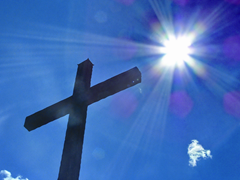Churches and children’s work
 A large share of Northern Ireland’s youth and children’s work is carried out by churches and faith-based groups. Peter Cheney considers the sector’s scale and how it fits into society.
A large share of Northern Ireland’s youth and children’s work is carried out by churches and faith-based groups. Peter Cheney considers the sector’s scale and how it fits into society.
While children’s work by churches often goes unreported, almost all churches in Northern Ireland are involved in it, ranging from crèches, children’s church, confirmation classes and Sunday schools, through to youth clubs and uniformed organisations.
“For churches and Christian parents a priority is to teach children about God, to share the good news of the Gospel with new generations,” Evangelical Alliance policy officer David Smyth told agendaNi. “Children love questions and the church’s prayer is that through learning and questioning, children will choose to have a personal faith in Jesus Christ from an early age.”
However, Christian children’s work also has a wider scope, including sport, social skills and discipline (e.g. the Boys’ Brigade’s marching competitions), and giving children the opportunity to meet and play with other children. Activities are also open to all children, whether they belong to a church or not.
A survey by Youthnet (a Northern Ireland network for voluntary youth work) conducted in 2005 found that 74.4 per cent of volunteer leaders, 68 per cent of registered youth groups, and 43.2 per cent of full-time youth workers were faith-based; the vast majority were church-based. This compares to around 45 per cent of the whole population attending church, according to a 2007 survey by the evangelical aid agency Tearfund.
The 1,405 registered faith or church-based groups had 98,902 members, 16,457 volunteer leaders and 160 full-time youth workers. Those groups were present, in significant numbers, in all parts of Northern Ireland, whether urban or rural, and most had a distinct Protestant or Catholic ethos as opposed to being cross-community.
Uniformed organisations (such as the Boys’ Brigade and Girls’ Brigade) and youth and children’s groups with a direct link to a church tended to be associated with Protestant and especially Presbyterian congregations. The Catholic Guides of Ireland, though, is an example of a Catholic uniformed organisation. The report noted that Catholic youth centres in Belfast made a major contribution in deprived areas.
Its author, Tony Macauley, also admitted that this is not the full picture. Many groups are not registered (which could include children’s groups in gospel halls) or are set up for a short time e.g. a holiday Bible club.
Scripture Union is an evangelical organisation which teaches the Bible in schools and on outreach teams. Its General Director, Helen Warnock, notes that the church “in its widest sense” has a strong legacy of working with children in Northern Ireland. “Good children’s work acknowledges its context,” she adds, as groups need to work out what works best in their own location and “cannot just import ideas”. Warnock is impressed by the wide variety of children’s work taking place and the long hours put in by volunteers week after week.
In Catholic thinking, the child is brought up in faith through the home, church and its schools. In 2010-2011, 529 of 1,219 schools in Northern Ireland had a Catholic maintained ethos. Bishop Donal McKeown has emphasised that Catholic schools are “not merely relics of the past but key players in the construction of a healthy and vibrant society where all our young people can flourish.”
The International Eucharistic Congress, to be held in Dublin in June, is a major focus for Catholic children’s and youth work this year.
Of course, the Catholic Church’s reputation has been damaged by child abuse scandals revealed over the last decade. Denominations have introduced stronger child protection policies and all children’s volunteers and workers are subject to Access NI checks, which are supported but are often seen as “expensive and time-consuming” according to David Smyth. “Perhaps a more streamlined system,” he suggests, “would continue to protect children but help encourage more volunteers and keep costs low.”





